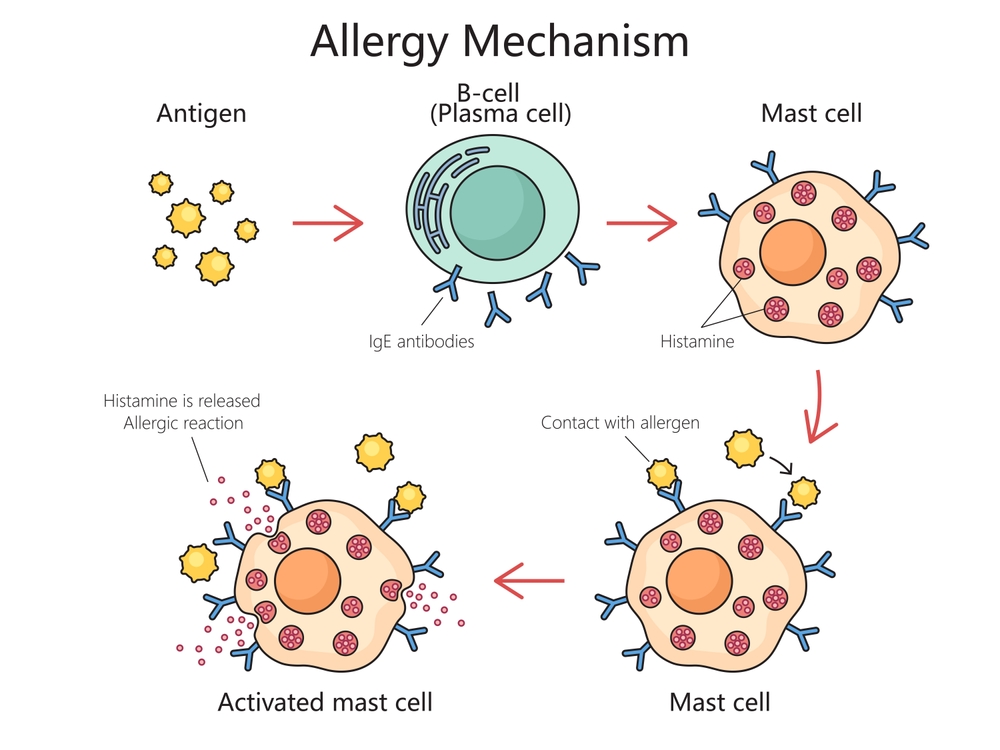Posted by: Maryland ENT in General
Do you seem to be battling never-ending sniffles, itchy, watery eyes, congestion, and other allergy symptoms? Are your allergy symptoms interfering with your work, slowing you down, or affecting your quality of life?
Persistent allergy symptoms can make you miserable and wreak havoc in your everyday life. Keep reading to learn more about allergies and the 5 signs your allergy symptoms may be getting out of hand!
What are Allergies?
An allergy occurs when your immune system reacts to a substance that is harmless to most people. The substance is known as an allergen and can include:
- Mold
- Latex
- Dust mites
- Pet dander
- Insect stings
- Cockroach saliva and feces
- Pollen from grasses, trees, and weeds
- Some medications like aspirin and penicillin
- Certain foods like eggs, milk, nuts, shellfish, soy, wheat, sesame, crustaceans, and fish
The severity of allergies tends to vary from individual to individual and may range from minor irritation to life-threatening.

What Causes an Allergic Reaction?
Your immune system protects you from disease-causing pathogens like parasites, bacteria, fungi, and viruses. It identifies and neutralizes harmful substances and removes them from your body.
If you have allergies, when you first encounter an allergen, your immune system mistakes it as a perceived invader and flags it as dangerous. Consequently, it creates an antibody called immunoglobulin E or IgE, ready for the subsequent exposure.
The next time you come into contact with the allergen, your immune system produces IgE antibodies specific to that allergen. For instance, if you are allergic to dust mites and are exposed to the tiny insects living in the dust created, an anti-dust mite IgE is produced.
A particular type of IgE antibody attacks every allergen. Whenever these IgE antibodies are released after exposure to an allergen, they travel and attach themselves to mast cells.
Mast cells are found in your stomach, intestines, nose, eyes, throat, mouth, and skin. Once IgE antibodies bind to mast cells, these cells identify a specific allergen as an enemy and release chemicals, including histamine, into your bloodstream to fight it off.
The release of histamine causes an allergic reaction. Symptoms of an allergic reaction can include:
- Sneezing
- Wheezing
- Congestion
- Runny nose
- Itchy, watery eyes
Signs that Your Allergy Symptoms Could Be Getting Out of Control
Allergy symptoms depend on the allergen involved and can affect your skin, digestive system, nasal passages, sinuses, and airways. They typically range from mild to severe and can include:
1. Itchy, Watery Eyes

Some common allergens, like mold, pollen, pet dander, or dust mites, can make your eyes water and itch. When you come into contact with an allergen, your immune system overreacts, releasing histamine and other inflammatory chemicals through mast cells.
Histamine causes the blood vessels in the conjunctiva to expand or dilate, leading to irritation. The conjunctiva is the thin mucus membrane that covers the inside of your eyelids and the front of your eye or sclera.
Itchy eyes are a response to the irritation caused by allergens. The itchiness can be very intense, resulting in frequent eye rubbing that can worsen the sensation.
At the same time, histamine increases tear production as a protective mechanism to flush out the perceived threat or allergens from your eyes, causing watery eyes.
2. Runny Nose
Do you constantly blow your nose? A runny nose is a hallmark symptom of allergies. When exposed to an allergen, your immune system thinks it’s intruding.
It swiftly releases histamine to defend you from the perceived invader. Histamine causes the mucus membranes in your throat and nose to become inflamed, irritated, and itchy.
The inflammation produces excess mucus in an attempt to trap and remove the invader. The excess mucus is usually experienced as a runny nose.
3. Wheezing
Wheezing occurs when you have trouble breathing due to constricted or narrowed airways. It can be described as a rattling or whistling sound coming from your chest while breathing.
Allergies can cause wheezing as the immune system reacts to allergens like dust mites, pet dander, and pollen. When the immune system detects an allergen in the body, it works hard to expel it.
In the process, your immune system triggers inflammation in your throat and nose, which causes your airway to constrict. As you breathe through a narrowed airway, the air is forced through a smaller space, creating a high-pitched whistling sound.
4. Sneezing
Sneezing a lot is a common symptom of allergies. When you have an allergy, your immune system mistakes allergens like pet dander, mold, or pollen for something harmful, like bacteria.
If an allergen gets inside your nose, the immune system generates IgE antibodies. These antibodies bind to mast cells, which release chemicals such as histamine to attack the allergens.
Histamine causes you to sneeze to try and displace the invading allergen.
5. Congestion

If your nose is frequently congested, allergies are likely to blame. Allergens like mold, dust mites, pet dander, or pollen may enter your nose.
When they do, your immune system sets off a chain reaction, including inflammation, swelling, and extra mucus production, to try to eliminate the perceived threat.
Combined, swollen nasal tissues and extra mucus block your nose. Congestion can make it hard to breathe through your nostrils. It can also leave your face and head feeling heavy, causing discomfort.
Allergy Treatment
If you’re experiencing troublesome allergy symptoms, seeing an ENT specialist is the first step towards feeling better. An ENT specialist can perform allergy testing to determine your allergy and map out an effective treatment plan.
The next step is determining treatment if you have allergies and receive a diagnosis. These can vary depending on your allergen triggers, allergy severity, and medical history. Treatment options can include:
- Steroids
- Nasal sprays
- Antihistamines
- Decongestants
- Mast cell stabilizers
- Immunotherapy
Get Your Allergies Under Control
The top-rated ENT specialists at Maryland ENT can help you determine the root of your allergy symptoms with comprehensive allergy testing. We’ll then determine the best allergy treatment to provide effective, long-term relief.
Are you struggling with allergy symptoms? Schedule your appointment today at Maryland ENT in Lutherville and Baltimore, MD! It’s time to find lasting relief.



